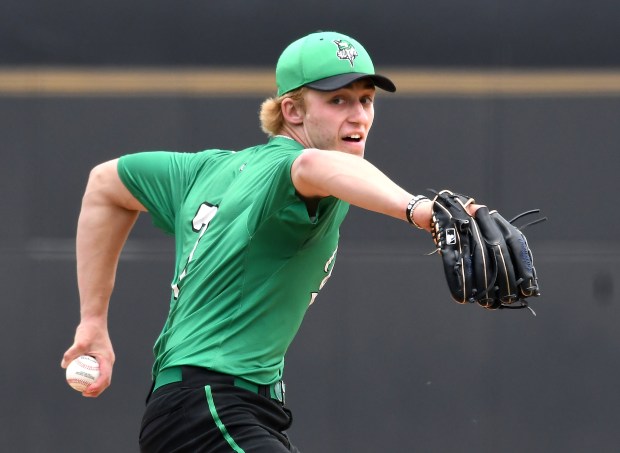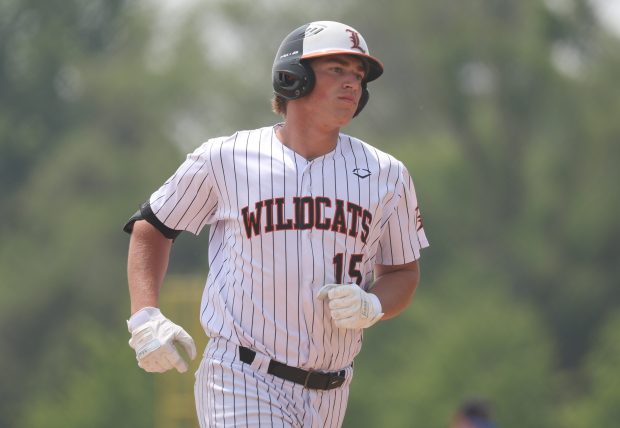A non-binding referendum question that was set to ask Aurora voters whether or not the city should limit the amount of money candidates for a city office can receive from those who do business with the city has been thrown out by the Aurora Electoral Board.
Petitions to put the referendum question on the April 1 ballot were filed by Ald. John Laesch, at large, who is running for mayor of Aurora, along with Working Families Aurora, a group that Laesch is a part of, according to a press release from Laesch.
Aurora City Clerk Jennifer Stallings confirmed that she received the petitions for the referendum on Dec. 30.
While the referendum was non-binding, meaning it would not have immediately created any new laws or restrictions if approved by voters, Laesch told The Beacon-News before the Electoral Board’s decision that it would have shown the Aurora City Council the level of support such restrictions have among their voters.
“We want to build public support to make sure that the rest of the council knows that this is where Aurora voters and Aurora residents are at,” he said at the time.
Specifically, the referendum question would have asked if the city of Aurora should create campaign finance rules that cap at $1,000 political donations to city elected officials and candidates for city office if the business, organization or person donating to the political campaign has previously received or is currently asking for a city contract, tax increment financing district or any other official action from the city.
The Aurora Electoral Board unanimously ruled on Monday that the petition did not reach the minimum number of signatures required by law to place the advisory referendum question on the ballot.
That board was made up of Mayor Richard Irvin, City Clerk Jennifer Stallings and Ald. Juany Garza, 2nd Ward, who is the Aurora City Council member with the second most seniority. Typically the alderman with the most seniority would sit on the board, but Ald. Michael Saville, 6th Ward, had a work commitment so Garza stood in as his substitute.
Irvin is running against Laesch in the upcoming mayoral race.
Monday’s Electoral Board hearing came after Ald. Patty Smith, 8th Ward, made an objection to the referendum question’s petition. Laesch did not show up to Monday’s hearing to defend the petition, and neither did anyone else.
John Fogarty, the attorney who represented Smith at Monday’s hearing, said the petition contained 2,044 signatures, which is short of the 2,957 signatures required to place the referendum question on the ballot.
To place an advisory referendum question on the ballot within a certain area, a petition must gather a minimum number of signatures equal to 8% of the votes cast in the governor race within that area during the last election, according to the 2025 Local Election Officials Handbook, which is issued by the Illinois State Board of Elections.
Fogarty also argued that the referendum question itself had a number of problems.
Because of the way it is written, the question would limit the campaign contributions of almost everyone doing business in or even living in Aurora, according to Fogarty. He said anyone asking for a permit to build a garage or even making a Freedom of Information Act request of the city would be limited in their campaign contributions, as those people would be seeking official action from the city.
The state of Illinois already regulates campaign contributions through a system that is “transparent” and “available to everyone,” so there is no need for “such an overlay of supposed campaign finance rules in the city,” Fogarty said.
Plus, the Aurora City Council has previously debated such rules, and they were rejected, he said.
“This is nothing more than a tactic, and it’s a shame when people continue to use the electoral process in a non-serious fashion,” Fogarty said.
In a campaign newsletter sent on Monday, Laesch said the challenge to the referendum question petition — in addition to an unsuccessful challenge to his spot on the mayoral ballot — were “designed to waste our time and money.” While he and others successfully defended their spots as mayoral candidates, his campaign would not be defending the referendum question petition in court, he said in the newsletter.
Laesch has long campaigned against the idea of city candidates and elected officials taking campaign donations from companies and individuals who do business with the city.
During his unsuccessful run for mayor in 2021, Laesch accused Irvin of engaging in “pay-to-play,” because Irvin has accepted campaign donations from developers who have received incentives from the city and from companies that have relocated to the city, according to past reporting.
Irvin denied the claims at the time, saying that pay-to-play is illegal, and that if he had done something illegal, someone would have raised a claim. Instead, those who donate to his campaign believe in the direction the city is going and so want him to stay mayor, he said.
During Laesch’s time on the Aurora City Council, he has also consistently voted against contracts for companies that have made political donations to the mayor or other aldermen, according to past reporting.
During a recent phone call, Laesch said he believes these political contributions are what is “driving the administration’s core focus” and “our contracting process.” For example, he alleged that requests for proposals are sometimes written in a way that only one company could possibly meet the qualifications.
“The question the taxpayers or the voters have to ask is, ‘Are we as taxpayers getting the best deals when there’s only one company winning the bid or when the developer has all these political ties?’” Laesch said.
After Monday’s hearing, Smith told The Beacon-News that, in addition to the points made by her attorney, it is bothersome to her that those who obtained the signatures for the referendum question petition did so with what she said was misinformation about how campaign fundraising currently works in the city.
In a press release supporting Smith’s objection to the referendum question petition, Irvin said Laesch’s concerns were misguided, and that the referendum question is looking to address a problem that “simply does not exist.”
Irvin’s comments in the press release mirrored those made by Fogarty about the state of Illinois’ existing campaign finance and election laws, calling them “clear, comprehensive and effective, ensuring transparency and fairness.”
He also said that Laesch has “not identified a single instance of illegal activity in Aurora that would warrant his proposed changes.”
On Monday after the hearing, Laesch told The Beacon-News in an email that Irvin’s “pay-to-play schemes are perfectly legal under current laws, and that is the problem.
“We need to reform the broken system of government at every level,” he said in the email.
rsmith@chicagotribune.com




